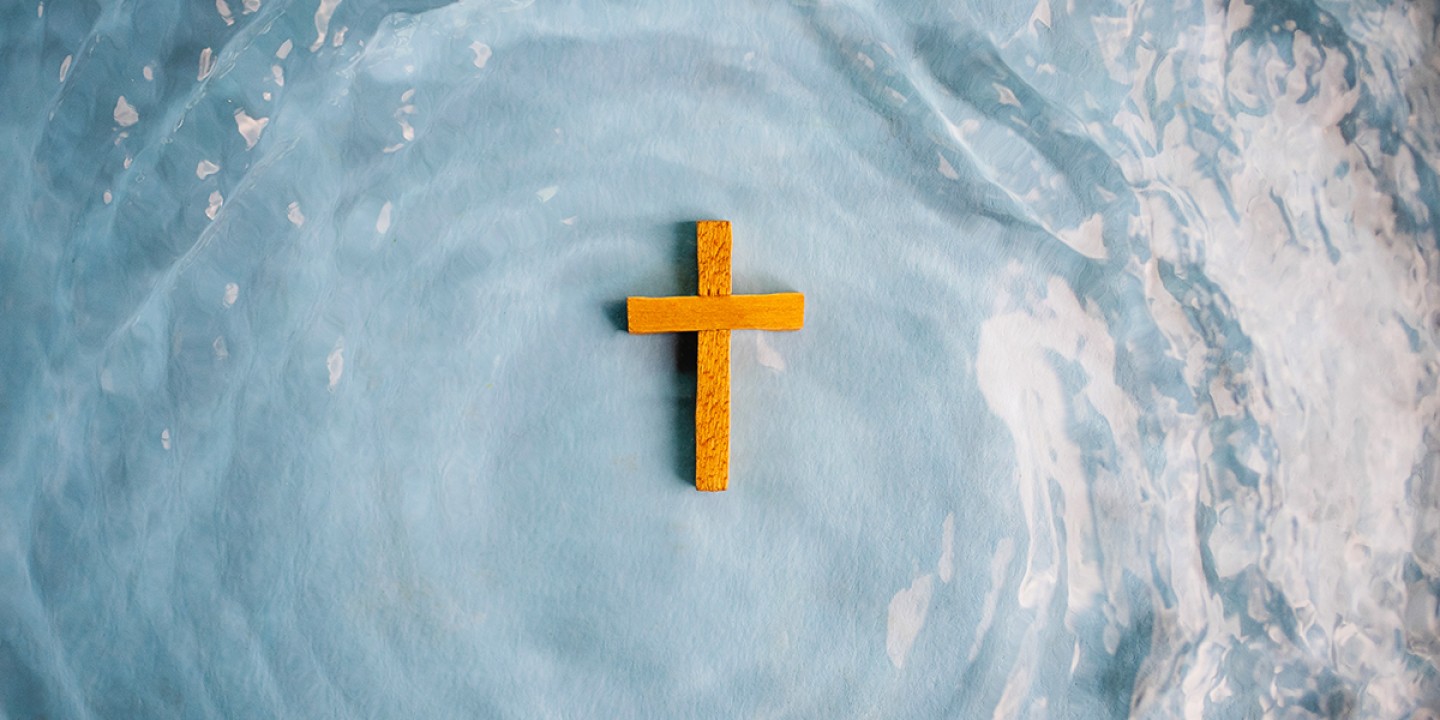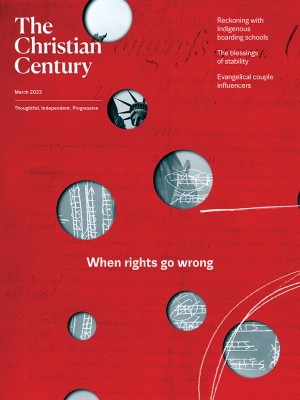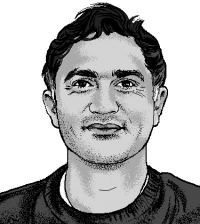
When we bear witness to someone’s baptism, we’re called to remember our own. When I remember mine, I think of my grandfather, mi abuelo, who baptized me.
I was young, a preteen. Papi was a deacon at his church, part of the Vineyard movement in Southern California. He stood in the water, at the shallow end of a swimming pool. As I stepped in, he offered me his hand and I took it, wrapping my arms around his arm. Then he dunked me, saying, “En el nombre del Padre, del Hijo, y del Espiritu Santo.” He baptized me into the people of God, his God becoming my God.
Years later I sit with him beside another pool, this one at my Aunt Mida’s apartment complex in Redondo Beach. I wear a T-shirt; he bundles his aged body in sweatpants, a hooded jacket, and layers of blankets. One hand is in a mitten, while with the other he slowly massages his index finger with his thumb, slowly, circle after circle. He is slumped in the patio chair, weakened after a heart attack, but his hands are strong.
Read our latest issue or browse back issues.
With those hands he once washed dishes in Miami restaurants, earning money to bring his family from Costa Rica—my abuelita and their seven children. Then he opened up a shop in Los Angeles where he sold and fixed bicycles, cut keys, and tinkered with whatever gadget a customer brought him until he figured out how to repair it. There was nothing he couldn’t fix with those hands, nothing he couldn’t do.
“Chito,” he whispers to me beside the pool. I turn my stare from his hands to the glow in his eyes. “Chito, remember when eras joven, pues como cinco años, y tenía un hammer allí en mi shop, y me ayudó with the bicycles?” I nod and laugh as scenes flash across my mind of him and me, side by side, his wrenches and screwdrivers laid out on the floor as he fixed a bike and me with a small hammer banging on blocks of wood, “helping.” Every weekday morning my mom would drop me off at his shop on her way to work, and I’d stay with him all day, watching his body hunched over bicycle frames as he welded joints, repaired gears, and rewired brakes. My abuelita would bring us café con leche and donuts in the morning, and in the afternoon he and I would walk across the street to Thrifty’s for ice cream.
His thin shoulders bounce up and down as he tells me the story about the time he found me hiding behind the office door at the shop, picking my nose in solitude. He tells this one frequently, and every time I blush and smile, embarrassed at a memory I don’t remember. As he laughs his body shakes, and I picture his leaky heart valve trickling out more and more blood. The doctors did the best they could, my aunt tells me, but fluid is still bleeding into his lungs.
As the sunlight shimmers on the pool’s water, I stare at his hands and then reach over to hold them. After our communion of silence, when I finally say that I have to go, he tells me to scoot my chair closer. He begins to pray, asking God to watch over me and go before me, asking the Holy Spirit to lead me further and further into Christ’s presence. He rests one hand on my shoulder and the other reaches toward my face. He lays his palm on my head, dropping his thumb to my forehead, where he gently marks the sign of the cross as he offers a benediction.
“El Señor te bendiga y te guarde,” he says, gathering all the strength his body allows. “El Señor alce sobre ti su rostro, y te dé paz.” Then, with my hands in his, his gaze locked into mine, he assures me that God is with me: “El Espíritu Santo está with you,” he says, “en tu corazón, always with you.”
This was the last time I saw Papi. He died soon after my visit.
To remember our baptism is to testify. We reach into our memories to notice God’s grace, to recount the communities that have made us who we are and the people who’ve extended the Spirit of Christ to us with their own hands and lives. To ask each other to remember our baptisms is to invite testimonies of God’s grace made flesh, to help one another notice the presence of Christ.
When I remember mine, my mind returns to Papi’s words of blessing: “El Espíritu Santo está with you.” Baptism manifests that promise, made as real as the people who’ve surrounded us with God’s love. As real as the water in that swimming pool where Papi dunked me into Christ’s resurrected life. The water is a witness—it testifies.
“God of grace, creator of waters,” we pray in our Mennonite baptismal liturgy, “your Spirit hovered over the deep.” God’s grace is as diffuse as the waters, rippling within the cellular life of our world. All of life is graced—every person, every community, every creature. We can’t extract ourselves from water, and we can’t separate ourselves from God’s care. To remember our baptism is to recognize, again and again, that we are as reliant on grace as our bodies are on water.
Baptism is a material acknowledgment— a sacramental proclamation—of our fundamental dependence on the one the Eastern churches call Christ Pantokrator, the sustainer of the world. From the font flows a spirituality of yieldedness—Gelassenheit, as the 16th-century Anabaptists preached—to the movement of the Spirit, a daily awareness of the presence of God’s grace in the world. “Although you only receive the sacrament of baptism once,” said Martin Luther, “you are continually baptized anew.”
Our baptismal waters live with us—around us and in us. The testimony of water reminds us of God’s grace and of the people who’ve shared it with us. Papi with me in the pool—and el Espíritu Santo, a companion to all of us, a presence as common and ubiquitous as water.






